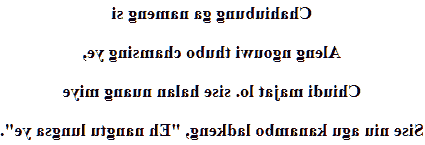Liangmai love poem
Chahiubung
Chahiubung ga nameng si
Aleng ngouwi thubo chamsing ye,
Chiudi majat lo. sise halan nuang miye
Sise niu agu kanambo ladkeng, "Eh nangtu lungsa ye".


→ French poem ←
Liangmei Naga language
Love poem translated into Liangmei Naga (alternative names : Liangmai, Quoireng, Zeliang, Lyangmay, Liangmei, Lyengmai, Kacha, Kacha Naga, Lyangmei, Liyang, Lianglad), a Sino-Tibetan, Tibetan-Burmese, Zeme-naga language from Manipur (Tamei, Senapati) and Nagaland (Ntu, Nchangram, Tapuan, Nzau and Tening), in northeastern India, which is write with our Romance letters.
In Nagaland there are about fifteen groups of Nagas so Nagamese (a Creole of Assamese), English and Hindi serve as vehicular languages.
Liangmai is considered an endangered language, and losing it, would be the risk of losing it with all the rich oral culture of Liangmai people, which has not yet been actually transcribed.
Nagamese is a Creole, which is spoken by almost all Nagas, and little by little is replacing their mother tongue ... and if we consider that Liangmai is only spoken in five or six villages, the pressure on this language is very strong to make it disappear, since in fact it is only in the religious and family frameworks that the Liangmai use it, and for the family, when the couple is not mixed. Liangmai people who are mixed with Zem people are also under the pressure of the language of these latter.
Aware of the threat weighing on Liangmai, as on the other Nagas languages, local communities organize teaching in schools of these languages ... but will this be enough, in the face of the pressure and the low rate of literacy, despite the establishment of a Liangmai literary committee?
The only chance of preserving this language, the use of which seems to be increasingly limited, is perhaps the desire that some have to want to keep it as a sign of their identity.
It is the young generation, who have the destiny of their mother tongue, with its ability to get involved, probably through writing, collecting oral tradition, and creating novels, poems etc.